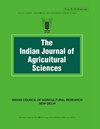印度病虫害和传粉媒介综合管理:迈向可持续农业之路
IF 0.7
4区 农林科学
Q4 AGRICULTURE, MULTIDISCIPLINARY
引用次数: 1
摘要
传粉者在维持栽培和野生植物,从而确保人类福祉方面发挥着至关重要的作用。不幸的是,虫害管理中采用的不分青红皂白的方法对有益的动物群,特别是传粉者产生了有害影响。考虑到农药对传粉媒介的有害影响,以及在有害生物综合治理(IPM)实践中缺乏对其福利的明确考虑,迫切需要将传粉媒介管理纳入IPM规划。将传粉媒介管理纳入IPM框架对于维持传粉媒介的健康、保护传粉媒介物种的多样性以及在减少与病虫害有关的问题的情况下实现最佳作物产量至关重要,而传统的病虫害管理方法往往忽视了这些方面。这种从IPM到IPPM(病虫害和传粉媒介综合管理)的转变突出了有选择地和明智地使用杀虫剂和其他对传粉媒介的习性、栖息地、繁殖能力、觅食行为、生长、发育和生存影响最小的病虫害控制策略的重要性。虽然IPPM的概念是由Biddinger和Rajote(2015)提出的,但我们的重点是解释其在印度背景下的相关性。在这里,IPPM对于将害虫种群数量减少到对经济有害的阈值以下,同时加强和保护传粉媒介至关重要。只有达到这种微妙的平衡,才能保持生态平衡,确保各种物种的持续存在和生态系统的可持续性。本文章由计算机程序翻译,如有差异,请以英文原文为准。
Integrated pest and pollinator management in India: A way forward to sustainable agriculture
Pollinators play a vital role in sustaining both cultivated and wild plants, thus ensuring the well-being of humanity. Unfortunately, the indiscriminate methods employed in pest-management have a detrimental impact on beneficial fauna, especially pollinators. Taking into account the harmful effects of pesticides on pollinators and the lack of explicit consideration for their welfare in Integrated Pest Management (IPM) practices, there is an urgent need to integrate pollinator management into the IPM programme. Incorporating pollinator management within the IPM framework is essential for maintaining the health of pollinators, preserving diverse pollinator species and achieving optimal crop yields with reduced pest-related issues- aspects that are often overlooked in conventionalpest management approaches. This transformation from IPM to IPPM (Integrated Pest and Pollinator Management) highlights the importance of selectively and judiciously employing pesticides and other pest control strategies that have minimal impact on the habits, habitats, reproductive capabilities, foraging behaviour, growth, development and survival of pollinators. Although the concept of IPPM was introduced by Biddinger and Rajote (2015), our focus lies in explaining its relevance within the Indian context. Here, IPPM is imperative for reducing pest populations below economically damaging thresholds while simultaneously enhancing and conserving pollinators. By achieving this delicate balance, the ecological equilibrium can be preserved, ensuring the continued existence of various species and sustainability of our ecosystem.
求助全文
通过发布文献求助,成功后即可免费获取论文全文。
去求助
来源期刊

Indian Journal of Agricultural Sciences
农林科学-农业综合
CiteScore
0.80
自引率
25.00%
发文量
273
审稿时长
6 months
期刊介绍:
The Indian Journal of Agricultural Sciences publishes papers concerned with the advancement of agriculture throughout the world. It publishes original scientific work related to strategic and applied studies in all aspects of agricultural science and exploited species, as well as reviews of scientific topics of current agricultural relevance.
Specific topics of interest include (but are not confined to): genetic resources, all aspects of crop improvement,crop production,crop protection, physiology, modeling of crop systems, the scientific underpinning of agronomy, engineering solutions, decision support systems, land use, environmental impacts of agriculture and forestry, impacts of climate change, rural biodiversity, experimental design and statistical analysis, the application of new analytical and study methods (including molecular studies) and agricultural economics. The journal also publishes book reviews.
Articles are accepted on the following broad disciplines:
Agric. Engineering & Technology, Agric. Social & Economic Sci., Agronomy, Biometry, Biosciences, Cytology, Ecology, Environmental Sciences, Fertilization, Forestry , Genetics, Horticultural Sciences, Microbiology, Pest, Weed Control etc., Molecular Biology, Plant Pathology, Plant Breeding, Physiology and Biochemistry, Soil Sciences, Special Cultivation Technology, Stress Breeding, Agric. extension, and Cell Biology.
 求助内容:
求助内容: 应助结果提醒方式:
应助结果提醒方式:


